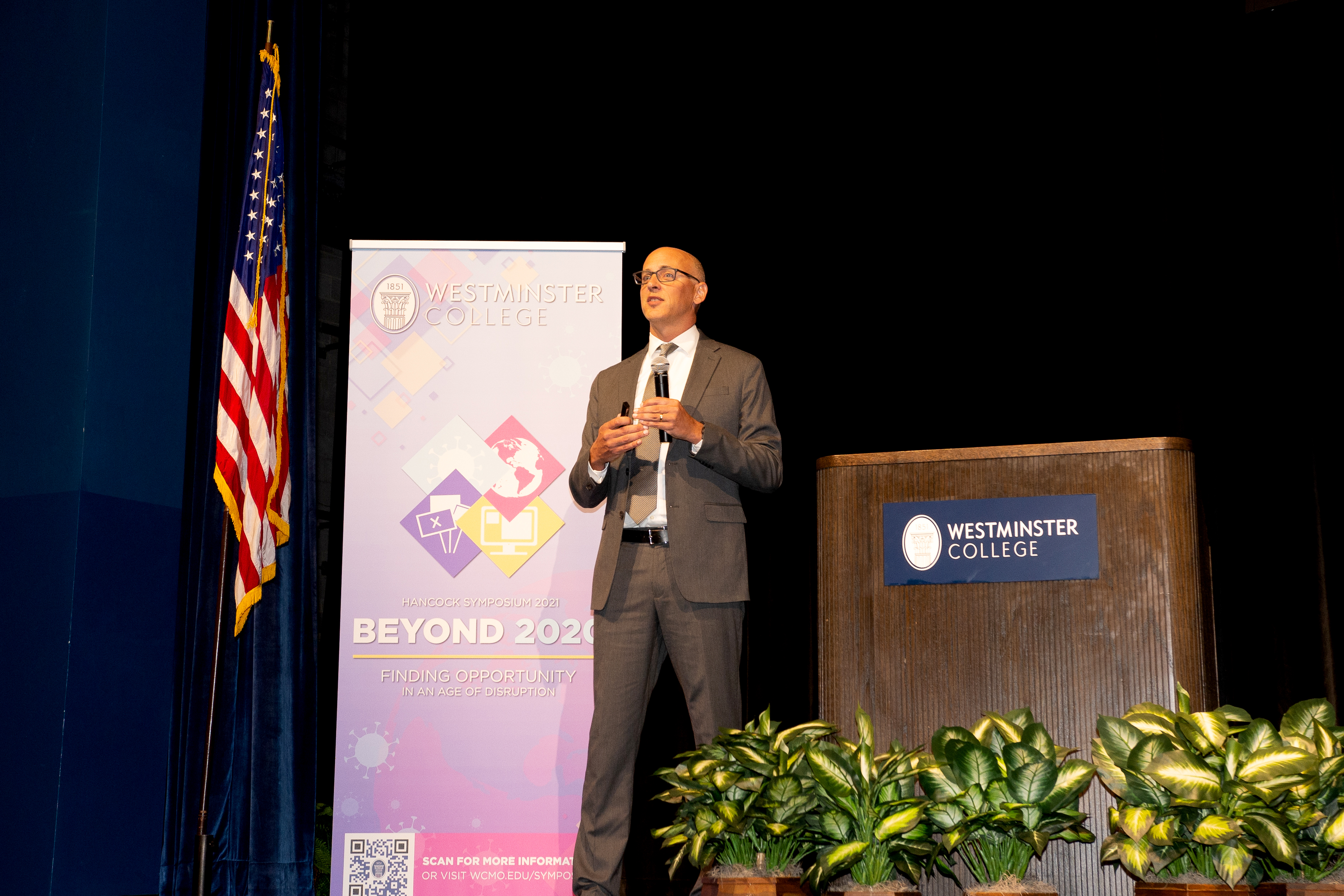Previous Symposia
Since 2006, the Hancock Symposium annually brings two engaging days of lectures, panel discussions and presentations by noted experts on one particular subject of global interest. The dynamic sessions challenge students through intellectual discourse, and the entire campus community participates in the events and learn together. Notable past speakers include Robert Kennedy, Jr., Sir Bob Geldof, Dr. Bennet Omalu, General David Petraeus, Senator Bernie Sanders, and Former Secretary of State, Madeleine Albright, among others.

Previous Hancock Symposium topics have covered a wide range of subjects, including:
Prospects for Peace in the Middle East (2006)
Featuring General David Petraeus, who was the first commander of the Multi-national Security Transition Command Iraq.
The Environment: Prospects for Sustainability (2007)
Featuring Robert F. Kennedy, Jr., Author and Environmental Activist who spoke on the importance of environmental policy for business, economics, and prosperity in the U.S.
Citizenship in the Age of Globalization (2008)
Featuring Eugene Robinson, a columnist for the Washington Post who spoke on the impact of immigration in the U.S.
Global Health: Who Cares? (2009)
Featuring both Dr. Syad Arshad Hussain and Nathan Wolfe, who spoke on health concerns around the world such as viruses, epidemic diseases, and children's welfare.
Global Conflict (2010)
Featuring James Baker, the 61st United States Secretary of State. During this Symposium, Westminster drafted a campus resolution declaring its commitment to "human rights and social justice in its governments, documents, and policies."
My Digital Life (2011)
Featuring William Roedy, an executive from MTV Networks, who spoke about global leadership in a changing age.
Religious Experience in Global Society (2012)
Featuring Dr. Eugenie Scott, the Director of the National Center for Science
Global Sport: A Common Language in a Diverse World? (2013)
Featuring Roberto Clemento, Jr., who spoke about his father's legacy as the first Latin American player to enter the MLB Hall of Fame and the importance of humanitarianism through sports.
So, You Say You Want a Revolution? The Arts and Culture in Action (2014)
Featuring Sir Bob Geldof, entrepreneurial businessman, global leader, activist, musician and Nobel Man of Peace award winner, who connects musicians,
Security vs. Liberty: Balancing the Scales of Freedom (2015)
Featuring U.S. Secretary of Homeland Security Jeh Johnson, who spoke about the immensity of the responsibilities placed upon the Department of Homeland Security and the importance of guarding against overreaction in the name of security.
Audacious Ingenuity: Pushing the Boundaries of Science (2016)
Featuring neuropathologist Bennet Omalu, MD, subject of the film Concussion, who spoke about his discovery of chronic traumatic encephalopathy (CTE), a condition afflicting professional football players, and his ensuing battle with the National Football League.
Advocacy and Activism: Leading from Where You Are (2017)
Featuring U.S. Senator Bernie Sanders, a 2016 candidate for president, who spoke of the need for a dramatic shift from force to diplomacy in American foreign policy.
Breakthrough (2019)
Featuring The Hon. Madeleine K. Albright, the former and first female U.S. Secretary of State. Albright’s lecture titled “For All Who Cherish Freedom: The Future of Democracy” generated more than 750 headlines and reached more than 150 million readers, viewers and listeners of traditional media throughout North America and as far away as Eastern Europe. She declared that democracy worldwide “appears to be in retreat.” She also issued a stern warning against the United States and other countries from becoming isolationistic while subsequently unraveling special relationships formed after World War II.
Vision & Values: Charting Our Paths to the Future (2020)
Re-envisioned for our unique time in history, Hancock Symposium 2020 offers a dynamic hybrid format that combines the virtual with the on-campus experience. Vision & Values 2020 will explore realms of human endeavor that embody a capacity for farsighted vision that is rooted in a commitment to deeper values.
Beyond 2020: Finding Opportunity in an Age of Disruption (2021)
If we needed reminders that life will serve up challenges none of us would have predicted, the year 2020 provided plenty. The great pandemic, heated protests over racial injustice, and a disputed election dominated the headlines. But other great disruptions troubled us at least as much: some as global as environmental disasters, others as personal as the loss of a job or a loved one in the midst of COVID-19. Disruption is often painful, but with it comes opportunity. When the familiar ways forward are blocked, we explore new ways, whether in science and technology, business and finance, politics and justice, or even in how we imagine community and relationships. Beyond 2020, we have the chance to break new ground, letting go of old paradigms and embracing new, innovative ways of working and living together. The 2021 Symposium invites Westminster students to actively and creatively examine the disruptions of 2020 in order to cast a vision for our collective future.
The Changing Nature of Work and Play (2022)
Technology, a pandemic, social justice movements, and generational shifts are just a few of many factors that have influenced the nature of employment, demanding a more flexible and collaborative work environment. From scientists around the globe putting their heads together to create a vaccine, to symphonies making music in harmony on Zoom, to couples job-sharing or flex-timing in order to meet the demands of family, the workplace of the future will require innovative and adaptable minds to maximize performance and employee satisfaction. At the same time, psychologists and Gen Z’ers alike understand the need for relaxation and "play" if workers are to be at their best. But play, likewise, has become marked by the influence of technology, as online gaming communities continue to rise, competing quite literally with physical games and sports. Finding the ideal balance of work, life, and play--for the individual, the employer, and our economy--becomes more challenging all the time. This Symposium will engage experts who will help us understand the impact of the changes we see and help us think carefully about the lives we want to build for ourselves. It will highlight the importance of values, character, lifelong learning, and problem-solving--all key components of a liberal arts education.
The Languages of Life (2023)
The words we speak, the movement of our bodies, the patterns of our DNA, and the characters that are eloquently drawn on pages for us to read are all examples of languages that we live and breathe daily. However, there’s more. How do the trees speak to one another to warn of a coming storm? How do companies persuade you to buy their product? How do politicians use phrasing to earn your vote? How do computers communicate with only zeros and ones and yet form a foundation for society? How does the shared experience of a culture or subculture create a vernacular only understood by its members? How can we foster better communication, by being inclusive and equitable with our words and our actions? This Symposium will engage experts who will help us understand the languages of our lives, and spur us to think carefully about how we choose to communicate with those around us. It will highlight the importance of values, character, lifelong learning, and problem-solving — all key components of a liberal arts education.
Out of this World (2024)
From the vastness of outer space to the infinitesimal scale of particles; from the creative fantasies of authors to the wonders of the modern cyber universe, where will humanity continue to explore, and what truths will we continue to reach for? What new frontiers will we discover using our ingenuity and imagination? What industries will we disrupt, and what outrageous activities will we consider mundane in the coming years? We’ll dig into modern and historical marvels and learn about our world by looking beyond it and deep within it. We’ll ponder the limitlessness of our own minds and creativity and reach for what comes next.
